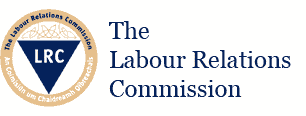More on Rights Commissioner Service
?
- Is this process compulsory?
- Is it possible to appeal against a Rights Commissioner's recommendation or decision?
- Are Rights Commissioners' hearings held in public or private?
- What happens at the Right's Commissioner's hearing?
- What should I bring with me to a hearing?
- Should I be represented at the hearing?
- How do I go about referring a dispute or claim to the Rights Commissioners Service?
- Who do I contact to seek a Rights Commissioner hearing?
- Legislation under which Rights Commissioners investigate disputes, grievances & claims
- Complaint Forms for use in availing of Rights Commissioners Service
1. Is this process compulsory?
A party to a dispute may object to a Rights Commissioner?s investigation where the case has been referred under the Industrial Relations Acts, 1969?1990 or under the Unfair Dismissals Acts, 1977?2005. Where such an objection is made, the Rights Commissioner cannot investigate the case. The applicant can instead request the Labour Court or, depending on the legislation, the Employment Appeals Tribunal to hear the case. A similar right of objection does not apply for referrals under the other Acts. A Rights Commissioner investigates such cases in the first instance.
2. Is it possible to appeal against a Rights Commissioner's recommendation or decision?
Yes it is, provided the appeal is lodged within the time limits set down in the legislation. The relevant Acts govern whether the appeal is to the Labour Court or Employment Appeals Tribunal. Having heard the appeal, the Court, or Tribunal, will issue a decision, which is binding on the parties to the dispute.
3. Are Rights Commissioners' hearings held in public or private?
Hearings before a Rights Commissioner take place in private - except where the dispute has been referred under the Payment of Wages Act, 1991. Hearings under that Act are generally held in public.
4. What happens at the Right's Commissioner's hearing?
The hearings are formal but not adversarial. Each side is given the chance to fully present their case. Written submissions are not needed but they are helpful to the participants and the Rights Commissioners in order to focus on the relevant points. It also helps the Rights Commissioners to have a record of the statements made at the hearing when considering his/her recommendation or decision following the hearing.
In some cases, it is possible to settle disputes between the parties on the day of a hearing, with the assistance of the Rights Commissioner.
It is entirely a matter for the Rights Commissioner to decide how to conduct a hearing. Rights Commissioners do not allow mobile phones, tape recorders, cameras or other recording equipment to be used at their hearings.
5. What should I bring with me to a hearing?
The Rights Commissioner?s function is to issue decisions or recommendations based on the facts and evidence presented at a hearing. For this reason you must ensure that relevant information (such as witnesses, payslips, correspondence, etc.), is available for the hearing.
6. Should I be represented at the hearing?
It is up to the claimant and the employer to decide if they wish to be represented at a Rights Commissioner?s hearing. A trade union, employer organisation, solicitor, friend or family member may act as the representative. Please notify the Rights Commissioners? secretariat as early as possible of the name and address of your representative. Correspondence will then be addressed to that representative. Our experience has been that it helps if each party brings a companion to the hearing whether as a representative or not.
7. How do I go about referring a dispute or claim to the Rights Commissioners Service?
Claimants should notify their employer of the complaint before referring the case to the Rights Commissioner Service. Where legal entitlements are involved, every effort should be made to settle the matter locally without recourse to a Rights Commissioner.
To refer a case, you have to fill out a complaint form and send it in to the secretariat of Rights Commissioners Service in the Labour Relations Commission. These forms are issued to assist claimants in submitting complaints under each Act. Copies of the relevant forms can be obtained on request from the Service?s secretariat. For legal reasons the complaint has to be submitted in writing to the Commission.
8. Who do I contact to seek a Rights Commissioner hearing?
Any person requiring the assistance of a Rights Commissioner should contact
The Secretariat,
Rights Commissioners Service,
The Labour Relations Commission,
Tom Johnson House,
Haddington Road, Dublin 4.
Email: pru@djei.ie
Or
Through the on-line Enquiry form
Telephone 613 6700 (01 area)
1890 220 227 (callers outside 01 area)
Fax (01) 613 6701
If you have a general query you may wish to contact Workplace Relations.
9.Legislation under which Rights Commissioners investigate disputes, grievances & claims
Adoptive Leave Acts, 1995-2005
Carers Leave Act, 2001
Competition Acts, 2002-2006
Employees (Information & Consultation) Act, 2006
Employment Permits Act, 2006
Industrial Relations Act, 1969-1990
Industrial Relations (Miscellaneous Provisions) Act, 2004
Maternity Protection Acts, 1994-2004
National Minimum Wage Act 2000
Organisation of Working Time Act, 1997
Parental Leave Act, 1998
Payment of Wages Act, 1991
Protection of Employees (Fixed ?Term Work) Act, 2003
Protection of Employees (Part-Time Work) Act, 2001
Protection of Young Persons (Employment) Act, 1996
Protections for Persons Reporting Child Abuse Act, 1998
Safety, Health and Welfare at Work Act, 2005
Terms of Employment (Information) Act, 1994
Unfair Dismissals Acts, 1977-2005
Statutory Instruments:
European Communities (Protection of Employment) Regulations, 2000
European Communities (Safeguarding of Employees Rights on Transfer of Undertakings) Regulations, 2003
European Communities (European PLC) (Employee Involvement) Regulations, 2006
From 3rd January 2012, complaint forms should be sent to
Workplace Relations Customer Service
Department of Jobs, Enterprise and Innovation
O'Brien Road
Carlow
